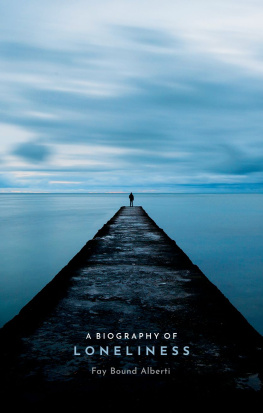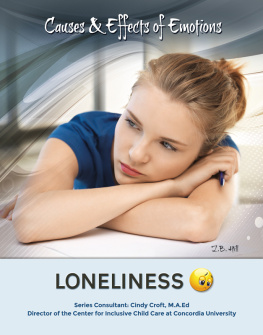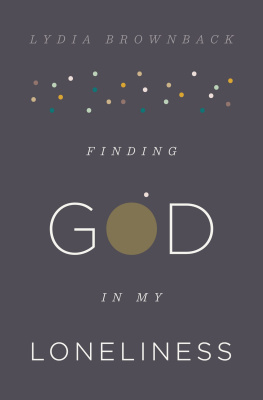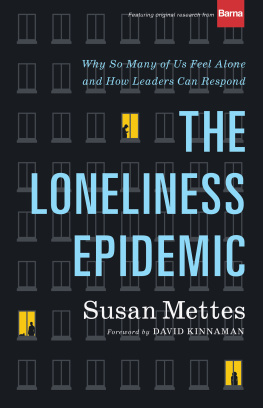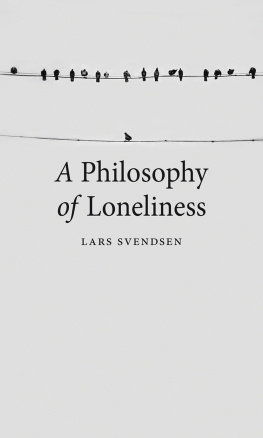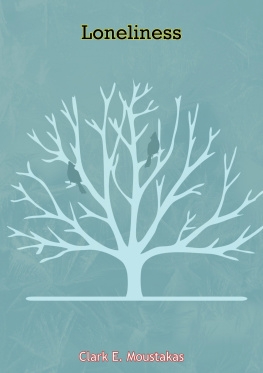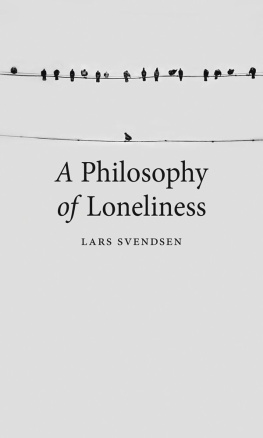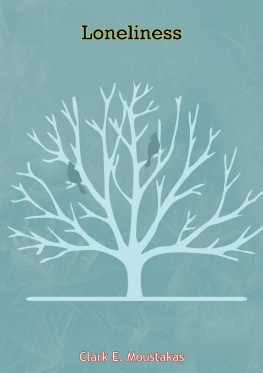A Biography of Loneliness

Great Clarendon Street, Oxford, ox2 6dp, United Kingdom
Oxford University Press is a department of the University of Oxford. It furthers the Universitys objective of excellence in research, scholarship, and education by publishing worldwide. Oxford is a registered trade mark of Oxford University Press in the UK and in certain other countries
Fay Bound Alberti 2019
The moral rights of the author have been asserted
First Edition published in 2019
Impression: 1
All rights reserved. No part of this publication may be reproduced, stored in a retrieval system, or transmitted, in any form or by any means, without the prior permission in writing of Oxford University Press, or as expressly permitted by law, by licence or under terms agreed with the appropriate reprographics rights organization. Enquiries concerning reproduction outside the scope of the above should be sent to the Rights Department, Oxford University Press, at the address above
You must not circulate this work in any other form and you must impose this same condition on any acquirer
Published in the United States of America by Oxford University Press
198 Madison Avenue, New York, NY 10016, United States of America
British Library Cataloguing in Publication Data
Data available
Library of Congress Control Number: 2019947207
ISBN9780198811343
ebook ISBN 9780192539342
Printed and bound in Great Britain by Clays Ltd, Elcograf S.p.A.
Links to third party websites are provided by Oxford in good faith and for information only. Oxford disclaims any responsibility for the materials contained in any third party website referenced in this work.
For Millie Bound and Jacob George Alberti, as ever.
For Jenny Calcoen for being my soul sister.
And for Sandra Vigon, for holding up a light.
PREFACE
No (Wo)man Is an Island
Why loneliness? Thats what people asked initially, when I told them I was writing this book. Well, not everyone. Those who hadnt lived with loneliness, hadnt felt its edges in the dark. Then in the space of a year, it didnt seem so strange a topic: loneliness became ubiquitous. It was talked of in newspapers and on radio programmes; it was a national epidemic; it had its own Minister. In the early twenty-first century we find ourselves in the midst of a loneliness epidemic, while worry about loneliness makes it more inevitable. Talking about loneliness seems to spread, contagion-like, until it has become part of the social fabric. Certainly, it has become a convenient hook on which to hang a number of discontents. Loneliness has become an emotional hold-all: a shorthand for the absence of happiness, for a sense of disconnect, for depression and alienation, for social isolation. Except when it isnt. Sometimes loneliness is sought out and desired; not just solitude, which has its own history, but also loneliness: that painful sense of disconnect which can be physical, emotional, symbolic, sensorial, attitudinal.
So what is loneliness, and why does it seem so ubiquitous? As a cultural historian who has spent a lot of time thinking about the emotional body, I am intrigued by how quickly a perceived yet undefined emotional state can give rise to such cultural panic. And I am interested in how loneliness, like other emotional statesanger, love, fear, sadnessmight take on different meanings depending on context; how loneliness can be physical as well as mental; and how loneliness as an individual experience might be shaped by and reflect bigger social concerns that include gender, ethnicity, age, environment, religion, science, and even economics.
Why economics? Loneliness is expensive, which is arguably why it has attracted so much governmental attention. The health and social care needs related to loneliness are escalating in the West, because of an ageing demographic. Notably the West: very little attention has been paid to the rest of the world, to how loneliness changes over time, or how it looks different in different lights. Presuming that loneliness is universal and part of the human condition means that nobody is accountable, no matter how much deprivation prevails. So, loneliness is political, too.
My interest was not purely historical. I have been lonely. And the different ways I have experienced lonelinessas a child, a teenager, a writer, a mother, a wife, a divorcewhatever the badges we give to our life stages, this is what gave me the idea for the books title. Loneliness has a biography. It is not a static thing but a protean beast that changes over time. Historically, loneliness has emerged as a modern emotion. And also as a concept which gets layered with meanings. A Biography of Loneliness is about the idea of loneliness in history, as well as the different ways it intersects with minds, bodies, objects, and places.
And places, as well as people, matter to the experience of loneliness. I grew up on an isolated Welsh hilltop. There was no internet in the 1980s. For most of my teenage years we had no telephone. The nearest neighbour was a mile away. My family experience was impoverished, unhappy, traumatic. Our Englishness set us apart from the Welsh-speaking villagers. We were hippies and most definitely Other. I was isolated and alone. And yet I did not endure loneliness; I enjoyed it. A natural introvert, I spent my days in the woods, making up stories, plotting alternative lives. My community was populated by fictional characters. Was it enough?
When I was a child, yes. Not when I was older. Our needs change with us. And so does our experience of loneliness. Loneliness in youth can become a habit in old age, so perhaps our interventions into elderly loneliness need to start far earlier. Lonelinessespecially chronic loneliness, linked to deprivationcan be terrible. When disconnected, socially or emotionally, from others, people can get ill. Deprived of touch, of meaningful human engagement, people can die. Chronic loneliness is not choosy; it often settles on the shoulders of those who have suffered enough, with mental or physical health problems, with addiction, with abuse.
Transient loneliness, by contrast, the kind you slip in and out of on lifes journeymoving away to university, changing jobs, getting divorcedcan be a spur to personal growth, a way of figuring out what one wants in relationships with others. And what one does not want, for loneliness in a crowd, or with a disengaged other, is the worst kind of lack. Loneliness can be a life choice and a companion, rather than a shadow. Sometimes loneliness is positive and nurturing, providing a space for us to think and grow and learn. And I do not mean merely solitude, or the state of being alone, but a profound awareness of the boundaries of the self which can, in the right contexts, be restorative. Some people step into loneliness and out again, then, like its little more than a puddle. For others, its an ocean without end.
Does loneliness have a cure? Or rather, does unwanted loneliness have a cure? For theres the rub: the element of choice. And there is no quick-fix treatment, no one size fits all. Loneliness as a modern social affliction has grown up in the cracks, in the formation of a society that was less inclusive and communal and more grounded in the scientific, medicalized idea of an individual mind, set against the rest. Loneliness thrives when there is a disconnect between the individual and the world, a disconnect that is so characteristic of neoliberalism, but not an inevitable part of the human condition.

